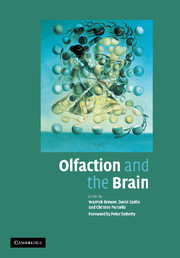Book contents
- Frontmatter
- Contents
- Foreword
- Preface
- List of Contributors
- Section I Neurology, Neurophysiology and Neuropsychology: Olfactory Clues to Brain Development and Disorder
- 1 Structure and Function of the Olfactory System
- 2 Olfaction and the Temporal Lobes
- 3 Role of the Insula in Smell and Disgust
- 4 Olfaction and Memory
- 5 Olfactory Neurogenesis: A Window on Brain Development
- 6 Olfactory Processing and Brain Maturation
- 7 Probes of Behaviour Regulation: Olfactory Models in Addiction
- Section II Social Functioning: Role of Evolution, Genetics and Gender
- Section III Assessment and Disorders of Olfaction
- Index
- Plate section
- References
6 - Olfactory Processing and Brain Maturation
from Section I - Neurology, Neurophysiology and Neuropsychology: Olfactory Clues to Brain Development and Disorder
Published online by Cambridge University Press: 17 August 2009
- Frontmatter
- Contents
- Foreword
- Preface
- List of Contributors
- Section I Neurology, Neurophysiology and Neuropsychology: Olfactory Clues to Brain Development and Disorder
- 1 Structure and Function of the Olfactory System
- 2 Olfaction and the Temporal Lobes
- 3 Role of the Insula in Smell and Disgust
- 4 Olfaction and Memory
- 5 Olfactory Neurogenesis: A Window on Brain Development
- 6 Olfactory Processing and Brain Maturation
- 7 Probes of Behaviour Regulation: Olfactory Models in Addiction
- Section II Social Functioning: Role of Evolution, Genetics and Gender
- Section III Assessment and Disorders of Olfaction
- Index
- Plate section
- References
Summary
Introduction
Olfactory deficits are found in neurodegenerative disorders, predominantly in later life, as well as in disorders with an onset in childhood or adolescence. The former will be considered in detail in Chapters 14–16. It is clear that the neuropathological changes accompanying neurodegenerative disorders are implicated in causing such deficits in olfactory abilities. In contrast, the processes underlying olfactory abnormalities in disorders of early development are less clear and are best understood in the context of dynamic brain maturational changes that are occurring at this time. Thus, neurobiology relevant to the deficits observed in disorders having a neurodevelopmental basis, such as the autistic spectrum disorders, attention deficit hyperactivity disorder (ADHD), obsessive-compulsive disorder (OCD) and schizophrenia, may relate more to abnormalities in the processes of brain maturation rather than to specific neuropathological processes, or to an interaction between brain maturation and other processes relevant to these conditions.
We suggest that in order to understand the nature of the deficits observed in various aspects of olfactory function in early developmental disorders, it is important to consider the nature of the normal brain structural and functional changes that are occurring at the time of their onset. It is likely that interruption of these normal processes by the emergence of such disorders at critical times of maturation adversely affect the development of olfactory functions. Interruption of normal neurodevelopment, reflected by olfactory deficits, may manifest as developmental arrest, developmental lag or possibly functional deterioration following onset of these conditions.
Keywords
Information
- Type
- Chapter
- Information
- Olfaction and the Brain , pp. 103 - 118Publisher: Cambridge University PressPrint publication year: 2006
References
Accessibility standard: Unknown
Why this information is here
This section outlines the accessibility features of this content - including support for screen readers, full keyboard navigation and high-contrast display options. This may not be relevant for you.Accessibility Information
- 6
- Cited by
